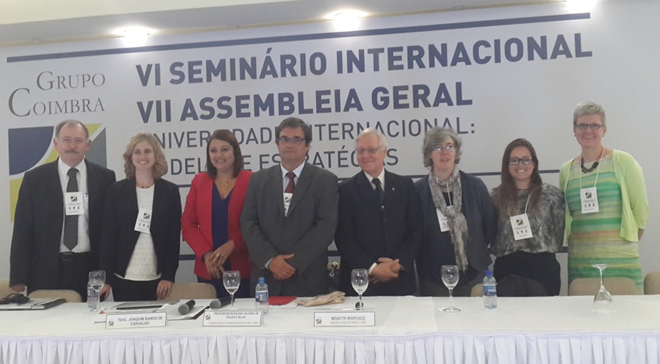IBE presents the Capes Doctorate
Sem categoria
0
 The Institute for Brazil Europe (IBE) presented its program to the President of Graduate Coordination of Improvement of Higher Education Personnel (CAPES), Jorge Almeida Guimarães. The presentation was made in Brasilia on July 18, at the headquarters of Capes.Na opportunity, assumptions have been discussed to fit the program of the Graduate IBE rules Capes.
The Institute for Brazil Europe (IBE) presented its program to the President of Graduate Coordination of Improvement of Higher Education Personnel (CAPES), Jorge Almeida Guimarães. The presentation was made in Brasilia on July 18, at the headquarters of Capes.Na opportunity, assumptions have been discussed to fit the program of the Graduate IBE rules Capes. With only a year and a half exitência, the IBE has formatted PhD in European studies and specialization in Public Management. Both with axes and themes common to Brazil and European Union countries. According to the coordinator of IBE, professor Moacyr Martucci explained to those present, a differential of the IBE program to existing programs at the partner universities is to offer a multidisciplinary treatment in the training of researchers through transdisciplinary research and theses.
It was also explained to members of the Capes, the program will be implemented in accordance with the partner universities of the IBE and the student will have two counselors in each area and one on each side of the Atlantic as well as a compulsory subject and interdisciplinary publication of articles together. Professor Moacyr presented as an example the education system of L'ecole des Hautes Etudes in Sciences Sociales.
The Coordinator of Graduate UFMG, Professor Myriam explained that at first, you will see the bibliography of the course the students that after reading, bring the discussion into the classroom and, secondly, the production of articles approved by a body of referees with constant exchange of knowledge.
Director of the Evaluation CAPES, Livio Amaral said the coordinator of Interdisciplinary Area Capes Arlindo Philippi Jr. for guidance and clarification of the proposed development of the IBE. Annually CAPES approves 300 programs graduate and there are more than 3,300 programs, but in practice it fails to specify the number of scholarships to be adopted without being subjected to the proposal.
The teacher said Moacyr will be 10 students per year and does not consider it impossible to provide scholarships FAPES and also by CNPq.
The next step will be to seek the IBE Professor Arlindo Philippi Jr. for guidance to work the structure of the proposal to be presented to CAPES (academic and scientific criteria). "We have to explain what is multidisciplinary, which the profile of professional and researcher who want to form, and themes as different as can be articulated," explains Professor Eliane Moura da Silva, representative of the IBE at Unicamp.
Once the proposal is pormatada within the criteria of interdisciplinarity adopted by CAPES and in accordance with the Specific Objectives of the IBE, a new meeting is scheduled in the second half to be formally submitted in early 2013.


